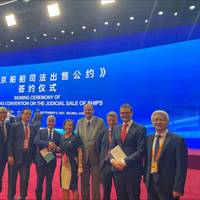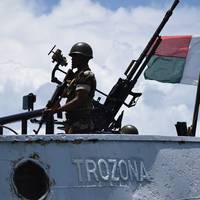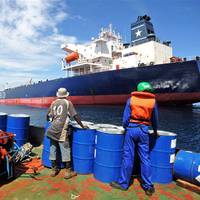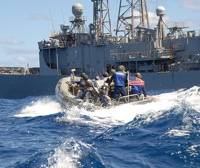15 Nations Sign Beijing Convention

The United Nations Convention on the International Effects of Judicial Sales of Ships (also known as the Beijing Convention) was signed by 15 nations and regions at a signing ceremony in Beijing on September 5, 2023.Signatories were: China, Burkino Faso, Comoros, El Salvador, Grenada, Honduras, Kiribati, Liberia, Sao Tome and Principe, Saudi Arabia, Senegal, Sierra Leone, Singapore, Switzerland and Syria. It will come into force when it is ratified by three state parties. The Convention…
Gulf of Guinea Tanker Hijacking: Pirates Abandon Ship, Take Some Crew Members with Them
Pirates have abandoned a Danish-owned ship that was hijacked in the Gulf of Guinea last week, and have taken some crew members with them, while others have been brought to safety, the vessel's owner said on Friday.The Liberian-flagged oil and chemical tanker Monjasa Reformer with 16 crew members was boarded by five armed people 140 miles west of the Republic of Congo's Port Pointe-Noire, its owner said at the time.The Monjasa shipping company declined to say how many crew members were still missing.The Reformer subsequently went missing, but was later located by the French navy off Sao Tome and Principe, Monjasa said in a statement."Our thoughts are with the crew members still missing and their families during this stressful period.
Maritime Security: Neo-colonialism in the Gulf of Guinea

Is neo-colonialism in the Gulf of Guinea the answer to West Africa’s maritime crime crisis?In October 2020, China’s transport ministry established an ad hoc workgroup to lay down precautionary measures for ships and seafarers passing through high piracy risk West African waters.The move came as China told its vessels to up vigilance and implement a series of precautionary measures to ensure the security of ocea-going vessels and seafarers amid rising attacks and a surge in kidnaps in the Gulf of Guinea.Plans outlined by Wu Chungeng…
46 Countries Support Torremolinos Declaration
The Cook Islands and Sao Tome and Principe have become the latest States to become Party to the Cape Town Agreement on fishing vessel safety.These small nations deposited their instruments of accession during the Torremolinos Ministerial Conference on Fishing Vessel Safety and Illegal, Unreported and Unregulated (IUU) Fishing (21-23 October).At the same time, they joined 44 other countries (46 in total) signing the Torremolinos Declaration, a non-legally binding political instrument.By signing the Declaration, the 46 States publicly indicate their determination to ensure the Cape Town Agreement reaches entry into force criteria by the tenth anniversary of its adoption (11 October 2022).
EU-UNODC Cooperation on Maritime Security and Surveillance
The European Union and the Global Maritime Crime Programme of the United Nations Office on Drugs and Crime (UNODC GMCP) have a long and effective relation in building capacities to tackle maritime crimes.The EU and the Global Maritime Crime Programme of UNODC started partnering in 2010 to support Eastern African states (Kenya, Seychelles, Mauritius and Tanzania) prosecuting piracy incidents off the coast of Somalia.Currently, the EU and UNODC GMCP are jointly working on capacity building support in Somalia, including training and mentoring of the Mogadishu Maritime Police Unit.The Global Maritime Crime Programme is currently preparing…
Abuja MOU to Enhance Shipping Standards in West, Central Africa
In a bid to harmonize port state control inspection procedures that will lead to the elimination of substandard shipping in the West and Central Africa sub-region, the Abuja Memorandum of Understanding (MoU) will host its 3rd Ministerial Conference and 9th Port state Control Committee Meeting with the aim of developing a unified system of Port State Control inspection procedure for the region. The Memorandum of Understanding on Port State Control for West and Central African Region generally referred to as Abuja MoU is one of the 9 Regional MoUs and national MoU established pursuant to IMO Resolution A.682 (17) of 1991. The Organization operates under a Cooperative Agreement with the IMO.
Cooperation for Oil Spill Preparedness in Africa
A regional conference of countries in west, central and southern Africa has committed to continue to work at both national and regional levels to boost preparedness to deal with oil spill incidents which could be devastating both for the marine environment and financially. The conference (6-9 November) in Abidjan, Côte d'Ivoire, was hosted by CIAPOL, the Ivoirian pollution control centre. It brought together industry and government focal points from 20 out of 22 west, central and southern African countries covered by the Global Initiative for West, Central and Southern Africa (GI-WACAF). This project is run by the International Maritime Organization (IMO)…
Oil Spill Response Workshop in Senegal
The use of oil spill dispersants, which can be used to break down an oil slick into smaller droplets as part of response efforts, is the subject of a workshop taking place in Dakar, Senegal (17-20 July). Participants from 11 countries (Benin, the Congo, Côte d’Ivoire, Democratic Republic of the Congo, Gabon, Guinea, Guinea-Bissau, Mauritania, Sao Tome and Principe, Senegal, Togo) are attending the sub-regional workshop, which will analyse national policies on dispersant use and provide training on further development and implementation of these policies. The event is also looking at how the Net Environmental Benefit Analysis – a decision-making concept used to help ensure that the response to an incident does not result in greater harm to the environment than may have already occurred.
Enhancing Search and Rescue Services in Western Africa
International Maritime Organization (IMO) is supporting countries in western Africa to enhance their national search and rescue (SAR) services with a regional training course and meeting taking place in Lagos, Nigeria this week. The activities are assisting Member States under the “Nigeria SAR Region” (Benin, Cameroon, Congo, Democratic Republic of Congo, Equatorial Guinea, Gabon, Nigeria and Sao Tome and Principe) to develop their regional SAR Plan and to increase regional cooperation. The training course (21-23 November) covered the duties of search and rescue “On-Scene Coordinators”, which was followed by the third meeting of the regional SAR Coordinating Committee.
South Africa arrests Chinese ships for illegal squid fishing
South Africa's navy has detained three Chinese ships with around 100 crew on board on suspicion of illegal squid fishing, officials said on Monday. The ships were spotted on Friday having entered South Africa's 200 nautical mile economic exclusion zone without permits. When South African officials asked the ships to sail to port they attempted to flee but were eventually captured. "We cannot tolerate the plundering of our marine resources, which are a source of food security," Agriculture and Fisheries Minister Senzeni Zokwana said in a statement. The three vessels - Fu Yuan Yu 7880, Fu Yang Yu 7881 and Run Da 617 - had a combined total of almost 600 tonnes of squid when the navy escorted them to shore. Inspectors found all three ships had no permits to fish locally.
Can Shipping Help Greece Ride out the Storm?
Greece is considered to be the world’s first ship-owning country in terms of tonnage. The Greeks are known to control 17.7% of world fleet and gaining share except in crude tankers. Even recession in the dry bulk market has not had much effect on the Greek-owned fleet with the fleet size touching 5,226 vessels last year with a total DWT of 334 million. For debt-laden Greece, shipping – a key element of Greek economic activity since ancient times – is considered a knight in shining armor at this crucial juncture. Most Greek shipping companies are family owned businesses which have been in shipping for many decades, even over a hundred years.
Captain, 2 Crew Convicted in Illegal Fishing Case
A Sao Tome and Principe court won a key victory against illegal fishing by organized syndicates on Monday when it convicted the captain of a vessel and two crew members on a number of charges, an Interpol official said. Globally, illegal fishing cost at least an estimated $23 billion each year, with one in four fish thought to be caught illegally in Africa with its bountiful marine life. Alistair McDonnell, a criminal intelligence officer at Interpol's fisheries unit, told Reuters that the FV Thunder was part of a fleet of six ships identified as some of the ocean's worst poachers. "This is a great result for transnational organized crime (fighting) cooperation because these guys have been doing this for 10 to 15 years," he said. "We are cutting away at the model.
Piracy Offshore Africa: Securing a Continent

The late Nelson Mandela once said: “I dream of an Africa which is in peace with itself.” At the EU-Africa summit in Brussels last month, European leaders urged their African counterparts to facilitate that dream by shouldering more of the security burden in their countries, both onshore and offshore. The summit coincided with reports of renewed piracy activity in the Gulf of Aden; ongoing attacks on shipping in the Gulf of Guinea, and explosions and mass arrests in Kenya, all serving to underline the scale of that challenge.
US Conditions of Entry for Vessels from Nigeria
The U.S. Coast Guard (USCG) has announced that it will impose conditions of entry on vessels arriving from the Federal Republic of Nigeria (excluding vessels arriving from certain ports) with effect from June 26, GAC reported in its daily Hot Port News Report. The USCG is authorised to impose conditions of entry on vessels arriving in U.S. waters from ports that it has not found to maintain effective antiterrorism measures. Ports in the Federal Republic of Nigeria were found to not be maintaining effective anti-terrorism measures, with certain exceptions. Beginning June 26, 2014, the below conditions of entry will apply to any vessel that visited a non-excepted Nigerian port in its last five port calls.
UN Urges Collective Action to Fight Piracy in Central Africa

Secretary-General Ban Ki-moon called on Central African leaders to collectively focus on conflict prevention in the subregion and to fight the threats of piracy and armed robbery at sea, as well as other security challenges. “This meeting offers a unique opportunity to find concerted and innovative solutions to problems that threaten peace and security in the Central African sub-region,” Mr. Ban said in a message to the 36th meeting of the UN Standing Advisory Committee on Security Questions in Central Africa (UNSAC), held in Kigali, Rwanda.
Guinea President Seeks Greater Counter-piracy Cooperation
Equatorial Guinea 's President, Obiang Nguema Mbasogo, called on the Gulf of Guinea heads of state to maintain stronger vigilance and create a maritime security body in order to overcome security and stability issues affecting the zone. President Obiang , who was named President of the Gulf of Guinea Commission (GGC), also expressed his desire to integrate more states bordering the gulf as members of the organization. The GGC was founded in 1999 with member states Equatorial Guinea, Angola, Cameroon, DR Congo, Republic of Congo, Nigeria, Sao Tome and Principe and Gabon. During his speech, President Obiang called for closer relations with international organizations such as the United Nations…
Maritime Law & Piracy Code Adopted by African Nations
IMO Secretary-General Koji Sekimizu welcomes the signature by 22 States of the Code of Conduct concerning the prevention of piracy, armed robbery against ships and illicit maritime activity in west and central Africa. The Code was adopted formally by the Heads of State meeting in Yaoundé, Cameroon, on Tuesday (25 June, 2013), attended by 13 Heads of State from west and central African countries. The document was signed in Yaoundé by Ministers of Foreign Affairs or other delegates, bringing it into effect for the 22 signatory States: Angola, Benin, Cameroon, Cape Verde, Chad, the Congo, Cote d'Ivoire, the Democratic Republic of the Congo, Gabon, Gambia, Ghana, Guinea, Guinea-Bissau, Equatorial Guinea, Liberia, Mali, Niger, Nigeria, Senegal, Sierra Leone, Sao Tome and Principe and Togo.
USS Simpson Trains 5 Countries in Anti-piracy

Guided-missile frigate USS Simpson completes two days anti-piracy training exercises in Gulf of Guinea. Participating in Obangame Express, a maritime exercise aimed to improve cooperation amongs participating nations, USS Simpson acted as a boarding vessel with role players and trainers for teams from five countries - Cameroon, Gabon, Ghana, Sao Tome and Principe, and Spain. Simpson also sent a boarding team to a Nigerian navy vessel, the patrol cutter NNS Nwamba, to practice boarding techniques while other personnel visited six ships for training with counterparts.
STP Coast Guard Utilizes Latest Technology
The Sao Tome and Principe (STP) Coast Guard has installed and have received training to use the latest surface surveillance program, the Regional Maritime Awareness Capability (RMAC) here, Jan. 28. RMAC, a U.S. Navy inspired coastal surveillance program, utilizes Automatic Identification System and ground-based radars and sensors to provide the user situational awareness in their maritime domain. This maritime domain awareness is an essential aspect of maritime safety and security in their region. STP is the first African country to have RMAC installed and integrated into the Maritime Safety and Security Information System, a global database used to track ships all across the world.
Cutter to Return from Africa
The Coast Guard Cutter Bear is scheduled to return home August 15 following an historic 90-day deployment to Africa. As part of a Theater Security Cooperation (TSC) mission with the U.S. Navy's Sixth Fleet, the Bear visited eight countries in North Africa and the Gulf of Guinea region, some of which had never hosted a Coast Guard vessel before. While there, the cutter and its 100-person crew worked with and trained the naval and law enforcement forces of these nations to enhance multinational interoperability and to cultivate relationships for possible future training opportunities. These goals are critical elements to the United States growing commitment to help establish regional stability in Africa.
U.S. Ship To Host Training Experts off African Coast
The USS Fort McHenry arrived off the coast of West Africa in November to lead an international team of experts that will train African sailors to confront the daily challenges of illegal fishing, piracy, drug trafficking and oil smuggling. The amphibious ship is the centerpiece of the new Africa Partnership Station (APS) initiative. During its seven-month deployment, it will serve as a floating platform in the strategically important Gulf of Guinea, where it will promote regional maritime safety and security. The West Africa program is modeled on a successfully completed Global Fleet Station mission in the Caribbean that helped promote port security and stronger borders in Belize, the Dominican Republic, Guatemala, Honduras, Jamaica, Nicaragua and Panama.
Navy Strategy of Engagement Builds Trust
The United States must engage with maritime partners around the world to create and build trust, according to senior Navy leaders speaking at the 2007 Surface Navy Association West Coast Symposium, held pier side at Naval Station San Diego, in August. Surrounded by ships and cooled summer breeze coming off the harbor, the many attendees heard about the Navy’s efforts to create and build upon meaningful partnerships. Rear Adm. Pete Daly discussed the Navy’s efforts to create a new maritime strategy. The previous maritime strategy addressed a Soviet threat that no longer exists. “We had one big enemy. We understood that enemy. We knew where they were coming from. In the past, military powers knew that military adventurism would be met with reciprocal force.
Gulf of Guinea Nations to Boost Maritime Surveillance
The AP reported that ministers from across Africa's oil-rich Gulf of Guinea agreed at a U.S.-sponsored meeting Wednesday to establish surveillance systems to try to stamp out illegal activity in their largely unpoliced waters. Representatives from 11 agreed in a statement to start using tools such as radar and locator transponders on ships to monitor activity off their coasts. The statement was issued during a three-day meeting in Cotonou, Benin, sponsored by U.S. government agencies and military. The U.S. government has been pushing countries to increase security along the little-watched West African coast, an area of growing importance for U.S. oil interests amid volatility in the Middle East.









